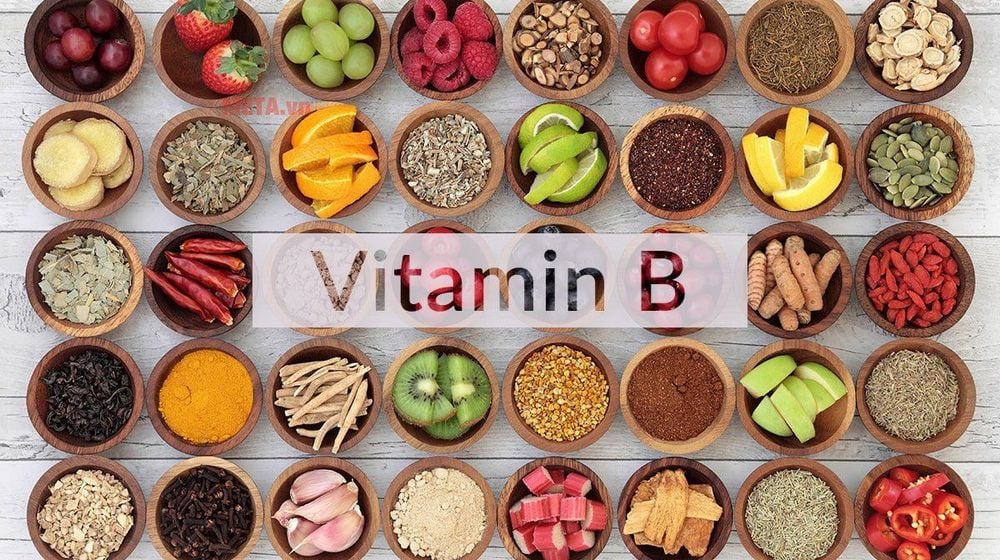This is an automatically translated article.
Although children don't necessarily need significant amounts of each and every vitamin in the B-complex, they do need most of them. B vitamins are very important for metabolism, helping to promote healthy development of both the brain and body, so it is necessary to supplement with B vitamins for children every day.1. What are B vitamins?
There are a total of 8 different vitamins in the B complex. An important thing you need to know about the B complex is that they are water soluble. This means they are water soluble and are not stored for long in the body. So, to maintain a steady amount of B vitamins, you must get them every day through diet or supplements.Here are the different vitamins included in the B vitamin complex and their common names:
- Vitamin B1 or thiamine
- Vitamin B2 or riboflavin
- Vitamin B3 or niacin, niacinamide
- Vitamin B5 or pantothenic acid
- Vitamin B6 or pyridoxine
- Vitamin B7 or biotin
- Vitamin B9 or folic acid
- Vitamin B12 or cyanocobalamin, methylcobalamin
2. Why should vitamin B group be supplemented for children?
Although children don't necessarily need significant amounts of each and every vitamin in the B-complex, they do need most of them. B vitamins are very important for metabolism, helping to promote healthy development of both brain and body, so it is necessary to supplement with B vitamins for children.However, each B vitamin does different things in the body as follows:
Vitamin B1: Thiamine helps promote the growth and strengthens nerves and muscles in children. It also helps the body convert carbohydrates into energy. Vitamin B2: Riboflavin promotes the production of healthy red blood cells in the body. It also supports energy production and digestive system function. Vitamin B3: Niacin helps the body convert fats and carbohydrates into energy that the body can use. It also supports the function of the digestive and nervous systems and maintains healthy skin and hair. Vitamin B5: Pantothenic acid is used in the metabolism of fats and carbohydrates. It also helps the body make red blood cells and adrenal hormones that regulate metabolism, the immune system and blood pressure, so your baby needs vitamin B supplements. Vitamin B6: Pyridoxine promotes healthy brain development in children. It also connects with chemicals like serotonin and norepinephrine, which help regulate mood, normal body function, and response to stress. Vitamin B7: Biotin promotes growth of healthy hair, nails and skin. It is also needed in the metabolism of cholesterol, amino acids and fatty acids. Vitamin B9: Folic acid helps form healthy red blood cells as well as contributes to the proper production of DNA. Vitamin B12: Cyanocobalamin is involved in the formation of red blood cells and promotes a healthy nervous system.

Bổ sung vitamin nhóm B cho bé giúp thúc đẩy phát triển cơ thể và não bộ
3. Supplemental sources of vitamin b group for children
B complex vitamins are found in many foods such as:Leafy green vegetables Dairy products such as milk, cheese and yogurt Red meat and poultry Fish, Eggs Nuts and seeds cereals Potatoes Fruits, especially bananas, grapefruits and watermelons As you can see, B complex vitamins are found in many different foods. However, for children who are picky eaters, getting B vitamins through food sources seems to be a difficult challenge. Many foods that contain B vitamins are things that children are more likely to refuse, like vegetables, whole grains, red meat, and fish. So what should parents do? One thing you can do is get creative in your cooking to offer these dishes in a more “fun” and kid-friendly form.
There are tons of recipes that can turn things like vegetables and other healthy options into delicious meals your kids really want to eat. However, not all parents have time to spend in the kitchen. Therefore, in these cases, you should consider other methods of giving your child B vitamins, such as through supplements or children's vitamins.
4. How many B vitamins do children need?
The recommended daily level of B vitamins depends on the age of the child. Recommended daily dose of B vitamins for children under 4 years of age:Vitamin B1 (thiamin): 0.5-0.7 mg Vitamin B2 (riboflavin): 0.6-0.8 mg Vitamin B3 (niacin) ): 8-9 mg Vitamin B5 (pantothenic acid): 3-5 mg Vitamin B6 (pyridoxine): 0.1-0.5 mg Vitamin B7 (biotin): 50-150 mcg Vitamin B9 (folate): 100-200 mcg Vitamin B12 (cyanocobalamin/methylcobalamin): 2-3 mcg Recommended dose of vitamin B supplements for children 4 years and older:
Vitamin B1 (thiamin): 1.5 mg Vitamin B2 (riboflavin): 1.7 mg Vitamin B3 (niacin): 20 mg Vitamin B5 (pantothenic acid): 10 mg Vitamin B6 (pyridoxine): 2 mg Vitamin B7 (biotin): 300 mcg Vitamin B9 (folate): 400 mcg Vitamin B12 (cyanocobalamin/methylcobalamin): 6 mcg As we see, no matter how old your kids are, they need a vitamin B supplement. The amount of each varies quite a bit, and perhaps the easiest way to ensure that your child is getting all the different vitamins and minerals is through supplements.
5. Can children take vitamin B supplements?
While many children will be able to get enough of the B vitamins through their diet, some children with dietary restrictions or allergies may not get enough of the B vitamins. Some signs of vitamin B deficiency in children :Worry Irritability Fatigue Slower-than-normal growth and development Dermatitis

Khi không bổ sung đủ vitamin nhóm B cho trẻ sẽ khiến trẻ cáu gắt,mệt mỏi
Therefore, the baby needs to add necessary micronutrients such as: Zinc, selenium, chromium, B vitamins, ginger, acerola fruit extract (vitamin C), ... to improve taste, eat delicious, achieve the right height and weight and exceed the standard, have a good immune system, strengthen the resistance to get sick less often and have less digestive problems.
The improvement of symptoms can take place for a long time, so it is recommended that parents be calm and persistent when supplementing with nutrients for children, even through eating or functional foods. In particular, the use of functional foods should choose those of natural origin that are easily absorbed, do not allow simultaneous use of many types or continuously change the types of functional foods.
For more nutritional knowledge and child care for each age, parents should regularly visit the website vimec.com and make an appointment with the leading doctors, pediatric and nutrition experts of the National General Hospital. Vinmec when needing advice on children's health.













